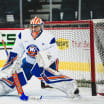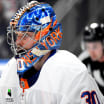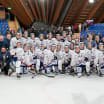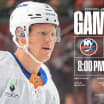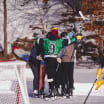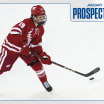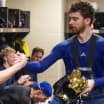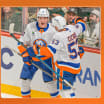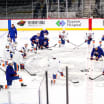"A man's reach should exceed his grasp; or what's a Heaven for?"
-- Poet Robert Browning.
Bill Torrey reached -- and he grasped. In the end Bryan Trottier became an Islander.
When Torrey landed Denis Potvin in the 1973 Draft, he built the foundation for his club's defense. With Bill Smith and Glenn (Chico) Resch, he was good in goal.
Next, Bow Tie Bill needed to pull off a second miracle catch; a bigger-than-big fish; someone in the Potvin genre; only this time a prize center. In the end, it would be the legend we came to simply call "Trots."
Maven's Memories: Bryan Trottier's Road to the Islanders
The story of how the Islanders acquired the franchise's all-time leading scorer
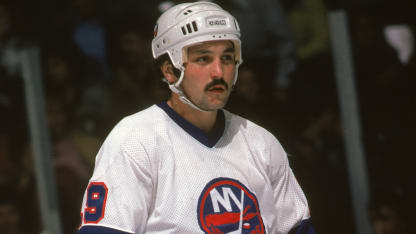
© B Bennett/Getty Images
By
Stan Fischler
Special to NHL.com
Bill had a plan to secure Trottier that was unique for its time. Because of continuous WHA signings of teenaged prospects, the NHL decided to permit the drafting of "underage" players in 1974. The top three picks that June were Greg Joly; Wilf Paiement and Rick Hampton.
Torrey's second round move was virtually ignored. He picked a relatively obscure and little-heralded 18-year-old center as the 22nd choice. At the time, Bryan had a baby face, suggesting that he still was in grammar school.
Trottier's family tree was interesting: as author Andrew Podnieks pointed out in his book, Players: "Trottier was a mix of French, Irish, Cree and Chippewa."
Bryan's father had settled in the town of Val Marie, Saskatchewan and it was there that the lad's parents ran a 960-acre farm with 70 head of cattle while also raising five kids.
Bryan thrived on the robust outdoors that was the quintessence of Western Canada life. "I started playing hockey at the age of nine," he remembered, "and my Dad told me what to do on the ice. If I didn't, I got my butt kicked!"
Farm life was tough -- especially in the frigid prairie winters -- but it shaped Bryan's work ethic and down-home values. It was there that he toughened his body and began displaying the talent that ultimately would lift him up the Western Junior hockey ladder.
Strong, hard on the puck and smart, young Trots mostly drew applause for his copious talents but, on some occasions, he was nastily needled about his mixed, part-Native American bloodlines.
"During Trottier's years in the WHL," wrote Podnienks, "he felt the wrath of racism."
The jabs from fans and foes merely inspired Bryan to hone his game to sharpness, and show up the critics
Skating for the Lethbridge Broncos during the 1973-74 season -- before being drafted -- he piled up points as if they were jellybeans. Fortunately, Torrey and his birddogs were scouting the Canadian prairies, searching for that elusive center. They became entranced by Bryan.
"The first time I saw him," Al Arbour recalled, "I'll never forget that the opposition -- trying as hard as they could -- simply couldn't knock him off his skates."
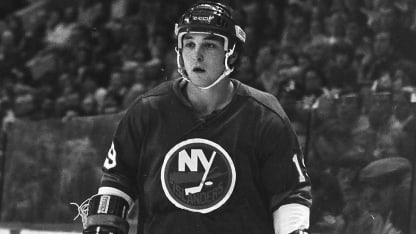
© Steve Babineau/Getty Images
In a hockey sense, Trottier had grown into the perfect hockey physique. He was a rock solid 5-11, 195 pounds with a skating technique in which he crouched so that he enjoyed a low center of gravity that made it difficult for foes to knock him off the puck.
After one look, Torrey knew he had landed his quarry: "Bryan would have been a high first-round pick the next year (1975), but we felt the extra year in Juniors would do him a lot of good. Fortunately, so did his parents.
"I explained to them that the only reason Bryan was drafted so young was that the NHL decided it had to take under-age players because they all would slip away to the WHA it was the only way we could compete."
Keeping Trottier in juniors for the extra season did wonders for Bryan's confidence and his arithmetic. By the time the 1974-75 season was completed, he posted a WHL-leading 98 assists in 67 games along with 46 goals and 114 points.
"That extra year in juniors helped him mature," said Arbour. Former NHL defenseman Rick Blight, who played against Trottier in the junior ranks, put it bluntly early in 1975. "Bryan is definitely the best player in Western Canada."
Podnieks: "He clearly was a superstar in the making!"
Yet, Bryan was overlooked when he showed up at the Islanders training camp in September 1975. If a press fuss was going to be made over a prospect, it was not for Bryan but rather a genuine Long Islander who the reporters considered "a good story."
Center Richie Hansen got all the early media attention because he was a 19-year-old native of Northport who had made a name for himself scoring goals for Sudbury in the Ontario Hockey Association. (Sudbury, by the way, happened to be Al Arbour's home town.)
Hansen survived the first training camp cut while Trottier skated in his shadows. But, eventually -- as they say -- genius will come out. Following the first exhibition game at the Coliseum, Hansen was farmed out.
Suddenly, the spotlight shone on the only rookie left in camp; the very quiet Trottier. One newsman was so taken aback by Bryan's taciturn nature, he wrote, "The kid appeared more like an awestruck autograph hound."
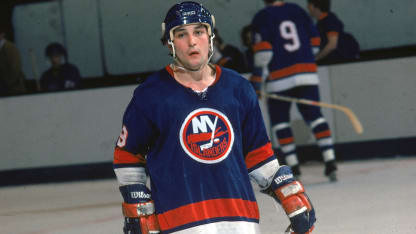
© B Bennett/Getty Images
In scrimmages it was a different story. One by one, the onlookers were flabbergasted by what they were seeing. This was especially true of the players.
Clark Gillies: "He's a tremendous skater." Billy Harris: "His poise stands out." Dave Lewis: "He's so cool." Denis Potvin: "He handles the puck like he owns it." Al Arbour: "Take pictures of number 19, he's going to be an ace."
The head coach decided to experiment with Trottier centering for Harris on the right and Gillies on the port side. The chemistry was evident after one workout,
"Bryan's main strength is that he's always coming up with the puck in the corners," Gillies explained. "He's always hitting me and Harry with accurate passes. He anticipates so well that he's often able to intercept passes and he rarely makes mistakes."
Exhibition games were one thing but the real tests would be in regular season contests. It was then -- in the season's opener at Nassau Coliseum -- that Trottier would live up to his billing.
In the first period he collided with Kings defenseman Bart Crashley, stole the puck and calmly flicked the disk past goalie Rogie Vachon. The time was 16.26 and it was a portent of things to come.
Trots added two more goals in a span of 24 seconds in the middle period. On top of that he added two assists for a team-tying record of five points in a single night. Plus, the Islanders won 7-0. Many months later he won the Calder Trophy as the year's top rookie.
Bryan set freshman records for assists with 63 and points, 93. Meanwhile, his skill turned the Isles' power play into one of the NHL's best and his presence between Gillies and Harris enabled Arbour to finally dispatch a genuine Grade-A first line to bedevil the enemy.
Diffident to a fault, Trots still was unsure about his acceptance into the Nassau fraternity until one episode convinced him that he belonged. It happened on Arbour's 43rd birthday when vets told the rookie that he was designated to deliver a custard pie to the coach's face.
Bryan was suitably horrified but there was no way out. Trots unleashed the baked missile which splattered over Al's mug. While the players' roared their approval, Bryan was momentarily mummified. He realized that he also had broken his mentor's glasses.
Trots didn't know whether he'd be ticketed to the minors for that, but before anyone could say "boo," Arbour laughed it off and Trots never had to worry about being an outsider in the dressing room, or on the ice, again.
At the end of that caper -- not to mention at the end of the season -- one could legitimately say that Bryan Trottier was the greatest thing that had happened to the Islanders in 1975-76. He was, in fact, a center-ice version of Denis Potvin; and a future Hall of Famer.
Bow Tie Bill Torrey had mined NHL gold once again!

© B Bennett/Getty Images
LISTS: TEN TRAITS THAT MADE THE ROOKIE BRYAN TROTTIER TICK:
1. TENACITY:The never-give-up quality that once led Hall of Fame defenseman Red Dutton to inspire with the words: KEEP PUNCHING, also was adopted as Trottier's theme.
2. RADAR:Although his rival, Wayne Gretzky, was more renowned for seeing things on the ice that others could not, Trots owned the same kind of all-viewing radar in his head.
3. TEAMSMANSHIP:While others might have become big-headed, achieving so much success so soon, Bryan invariably gave credit to his mates rather than taking it himself.
4. TOUGHNESS:Like many Western Canadians of his era, The Kid played the game as hard as anyone. His bodychecks were mean -- but clean.
5. DECEPTION: In 1975, the rookie had a choir boy look about him that often lulled opponents to believe that he could be intimidated; which was not the case at all.
6. MOTIVATION:When Boston Bruins G.M. Harry Sinden was asked to rate the rookie, Trottier, he said, "Bryan's too small to be a superstar." Error for Harry. Motivator for Trots.
7. PLAYMAKING:Both of Bryan's linemates, Billy Harris and Clark Gillies, swore that they never could have succeeded as well as they did without their center's tape-to-tape passes.
8. SHOOTING: Although Trots always preferred setting up a goal for his mates, he was an accurate -- and hard -- shooter with a howitzer drive that deceived many goalies.
9. DEFENSE: Famed for his relentless forechecking, Bryan always was diligent about the backchecking part of his game.
10. POWER-PLAYING:Before the 1975-76 season, the Islanders power play was more power-less than effective. One more ingredient was needed and Trots provided it.
NEXT WEEK: PAIN AND PROGRESS -- THE BITTER-SWEET PRESCRIPTION FOR VICTORY.

